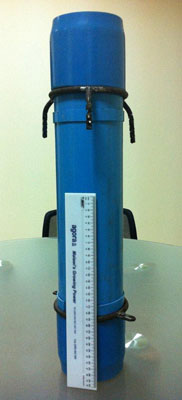| Dear defender of Malawi cichlids!
If everything goes to plan he will have divers who are in need of 50-60 dives for their certification as dive master, 30-40 dives of which are just to build up experience and not part of the training. During such non-training dives he will have these divers drill holes in the rocks and anchor the ANDs at specific places around the island. We found out that you can run a pneumatic drill from a SCUBA tank and the idea is that a diver goes down with a double tank of which one is used to drill 1-2 holes in a rock. A stainless steel lug bolt is inserted in the rock and the anchor cable of the AND attached. I have bought already the drill but will try it out at home if all works underwater before I send it off to Malawi. Anxious to do more for the environment Leon also offered to start replanting the sandy area along the east coast of the main island. Over the years beach seines (illegal on the islands of course) have taken out all vegetation. On the other side of the island there are still a few clumps of Vallisneria and from there he is going to replant Bata Bay, as the small bay along the east coast is called. Before putting any new plants in he is going to place some large rocks strategically on the sandy bottom so that nets cannot be moved over the plants. This work he will start first as we are in the process of getting quotes on the stainless steel material for the ANDs in South Africa and then the contraptions have to be welded and put together. In cooperation with Dimitri, Leon is planning a minimum-impact dive camp on the main island (the lodge is on Nankoma, the second largest island of the group) near Bata Bay. To have a camp site right there where work is needed will be beneficial to the project and volunteers can also stay at this camp on Maleri Island. For almost 18 months the project had been in limbo during which local fishermen realized that fishing was at some places again possible. Since Parks found that something had to be done in the interim they recently installed a team of guards (paid by Parks & Wildlife) with a boat at the islands. We decided to also support these men by providing fuel so that they can continue to make their daily inspection rounds. In this way we are going to protect the cichlids with a two-pronged approach and when Leon will be successful in replanting Bata Bay also that will drastically increase the nursery grounds for many utaka found at the Maleri islands. Pennstate has more than $12,000 ready to be sent to Malawi and these funds will go towards the purchase of the material necessary to make 200 stainless steel ANDs. It starts to look good for Malawi cichlids! Expect some photos and video clips this fall!
Without your input and generosity many Malawi cichlid species will not be there 20 years from now. Enjoy your
cichlids! |
||

